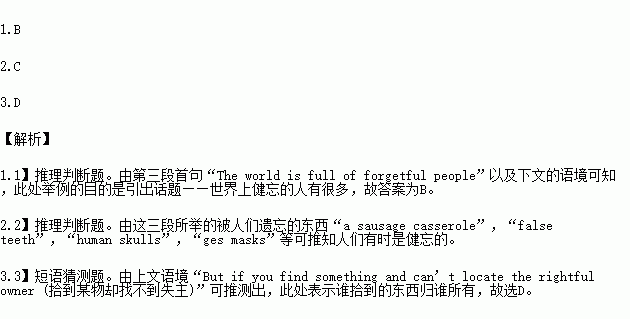题目内容
Five years after they disappeared, lost jewels belonging to the wife of a US ambassador to the Netherlands were found.
Dawn Arnall had already received an insurance payout for her loss. However, the misplaced gems had been found and held for safe keeping by a hotel she stayed in. staff were unaware that the jewels were worth $ 9m.
The world is full of forgetful people. A man in the English town of Reading even left a sausage casserole in a bus. The dish ended up in the Lost Property Office until it was recovered by his mother, eager for her dinner.
A walker in the Lake District had his food in his mouth but … what about his teeth? After climbing a hill in 2007, David Packer stopped for a chocolate bar. He took his false teeth out, wrapped them up in a tissue and just forgot about them. It took more than a year for the walker to be reunited with them.
Over the past 78 years passengers on London’s transport network have left behind items including human skulls and gas masks from World War II. Since 1934, staff have handled an average of 200 000 items a year. Recently they have used computers to try to track down their owners.
But if you find something and can’t locate the rightful owner, is it finders keepers? It depends on what’s found and how, says John Spencer, professor of law at the University of Cambridge.
“If you pick up a coin, you can keep it unless you saw someone drop it, as you wouldn’t be able to find the owner by taking reasonable steps.”
If it’s a larger sum, you should report it to the police but if the item has been abandoned, the property is yours. One man’s loss is another man’s gain!
1.Dawn Arnall is mentioned in the first two paragraphs to .
A. attract readers’ attention to the jewellery
B. introduce the topic
C. make a summary
D. get people think
2.Judging from the examples given in the third, fourth and fifth paragraphs, people can be .
A. generous B. experienced
C. forgettable D. honest
3.What does the underlined part in the sixth paragraph mean?
A. It depends on the law whether to keep something you find.
B. One man’s loss is another man’s loss too.
C. It’s immoral to keep something that doesn’t belong to you.
D. Whoever finds something can keep it.


 on't waste your money on this magazine. 60-70 percent of it are advertisements, and the articles offer little useful information. It might be suitable for children, but not adults who are serious about educating themselves about dogs.
on't waste your money on this magazine. 60-70 percent of it are advertisements, and the articles offer little useful information. It might be suitable for children, but not adults who are serious about educating themselves about dogs.